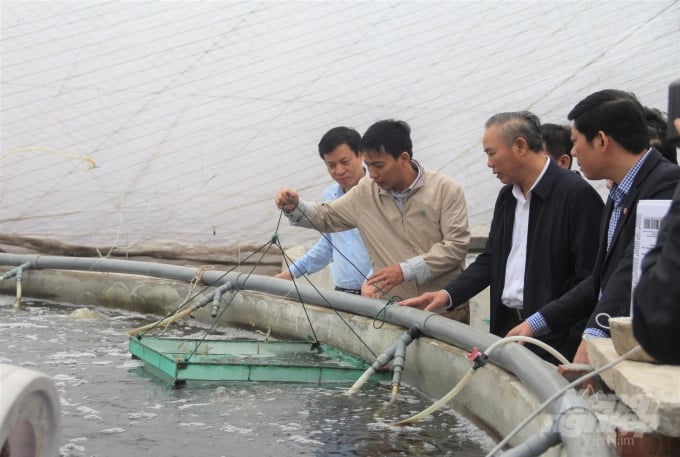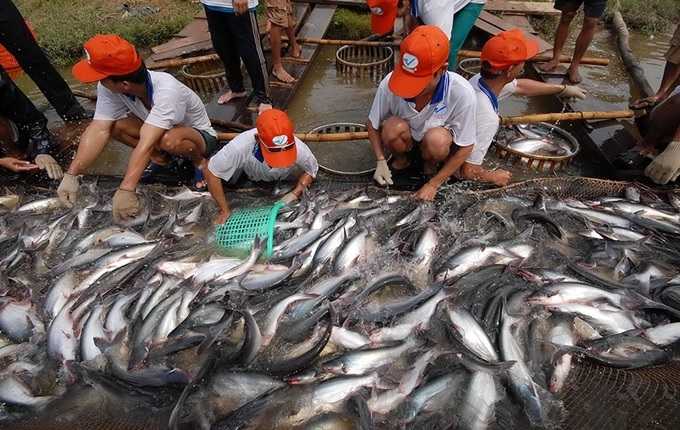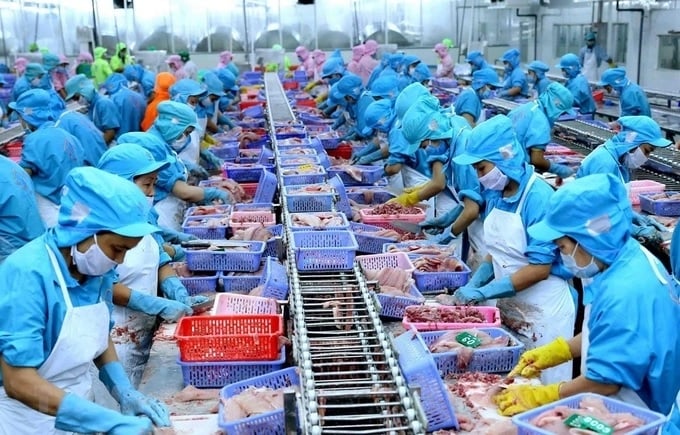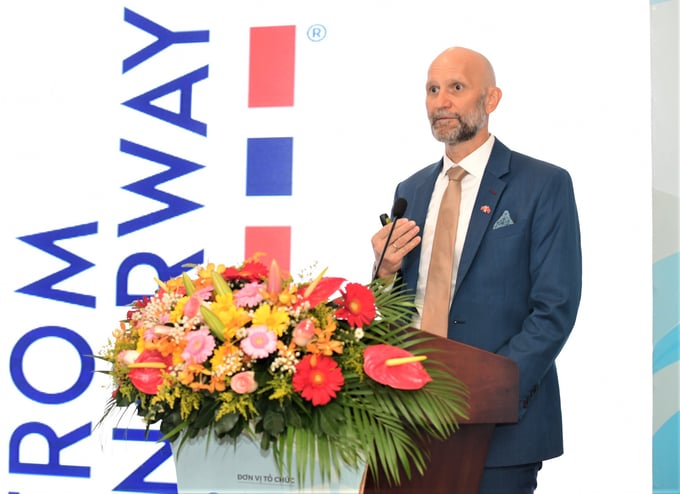May 20, 2025 | 12:32 GMT +7
May 20, 2025 | 12:32 GMT +7
Hotline: 0913.378.918
May 20, 2025 | 12:32 GMT +7
Hotline: 0913.378.918

Deputy Minister Phung Duc Tien inspects aquaculture activities in Thai Binh province. Photo: Pham Hieu.
On March 31, the Ministry of Agriculture and Rural Development, Tuoi Tre newspaper, People's Committee of Ba Ria - Vung Tau province, and Vietnam Association of Seafood Exporters and Producers (VASEP) co-organized a seminar on "Developing link chains, raising Vietnamese fisheries brand".
Making the opening speech, Deputy Minister of Agriculture and Rural Development Phung Duc Tien said, "2022 was a challenging year. Still, Vietnam's agricultural industry has recorded many significant milestones, especially success in the field of fisheries."
To be more specific, seafood export turnover in 2022 reached US$ 11 billion, of which shrimp exports were US$ 4.3 billion, pangasius US$ 2.5 billion, and seafood US$ 3.2 billion (tuna US$ 1 billion, squid and octopus US$ 768 million).

According to Deputy Minister Phung Duc Tien, on the condition that many businesses have promoted a sharp increase in aquaculture investment, Vietnam's fisheries industry will have great room for development, especially in terms of product value. Photo: Cong Han.
However, the seafood industry faces many difficulties due to inflation, high-interest rates, and weak infrastructure. The effects of climate change, pandemics, uncontrolled environment, inadequate processing, and scattered small-scale livestock production also significantly affect the development of the fisheries sector, which has not been improved.
According to Deputy Minister Phung Duc Tien, the fisheries sector has set targets towards the year 2030. For example, the annual growth rate of aquaculture production value reaches 3-4%; total domestic production of aquatic products reaches 9.8 million tons (aquaculture output 7 million tons, fishing output 2.8 million tons); seafood export turnover reaches US$ 14 - 16 billion.
"Considering the current farming conditions and the fact that many businesses have promoted a sharp increase in aquaculture investment, Vietnam's fisheries industry will have great room for development, especially in terms of product value," said Deputy Minister Phung Duc Tien.

Vietnam's fishery sector has set a target that the export value will reach US$ 14-16 billion by 2030. Photo: TL.
In order to achieve the set targets, Deputy Minister Tien said that the fishery industry needed to improve its competitiveness in seeds, feeds and biosecurity measures, especially for subjects that are mainly farmed such as shrimp and pangasius. In addition, trade promotion must be promoted in large markets such as the United States, China, and Japan.
Sharing at the seminar, Mr. Asbjørn Warvik Rørtveit, Regional Director for Asia Pacific of the Norwegian Seafood Council (NSC), said that 2022 was the year that Norway's seafood exports achieved the most success.
Accordingly, Norway exported 2.9 million tons of seafood with a value of about US$ 14.5 billion in 2022, an increase of US$ 2.9 billion compared to the previous year. In 2022, Norwegian seafood products were exported to 149 markets worldwide.
According to Mr. Asbjørn Warvik Rørtveit, regarding the value of Norwegian seafood exports, salmon holds a positive value with a price of approximately US$ 10/kg. Recent surveys show that the selling price of this item in the Vietnamese market is US$ 30/kg.

According to Mr. Asbjørn Warvik Rørtveit, salmon accounts for a considerable value in Norwegian seafood exports. Photo: Pham Hieu.
“Vietnamese businesses can sell at three times the price due to the brand value of Norwegian salmon. Vietnamese customers are willing to pay that price. We are not too focused on increasing the output but on improving the quality of the salmon,” said a representative of the Norwegian Seafood Council.
According to Mr. Asbjørn Warvik Rørtveit, Norwegian seafood is harvested from coastal and inland waters, then preliminarily processed to be delivered to processing plants and then transformed into cooked, canned and ready-to-eat products to add value.
Norway is one of the world's largest seafood exporters and has a well-developed value chain thanks to applying methods with 5 core values: sustainability, quality, traceability, innovation, and cooperation.
This country has implemented strict regulations and controls for wild fishing and aquaculture to ensure a sustainable seafood harvest. This approach ensures that the country's seafood resources are managed responsibly, minimizing negative impacts on the environment.
Translated by Ha Phuc

(VAN) Khanh Hoa is investing over 545 billion VND to develop 240 hectares of high-tech marine aquaculture in order to guarantee a consistent supply of seafood exports and achieve the USD 1 billion target.

(VAN) Minister of Agriculture and Environment Do Duc Duy held a meeting with Soopakij Chearavanont, Chairman of C.P. Group, on May 15.
/2025/05/16/3800-0-nongnghiep-143756.jpg)
(VAN) Suntory PepsiCo Vietnam coordinated with the Ministry of Education and Training to implement an education program on water conservation, reaching nearly 1 million primary school students nationwide.

(VAN) Vietnam’s TH Group officially put its high-tech fresh milk processing plant into operation in the Russian Federation, marking a historic moment as the first TH true MILK cartons were produced in Russia.

(VAN) Use of high-quality broodstock and biotechnology is regarded as the most effective approach to ensuring sustainable and economically viable shrimp aquaculture ahead of climate change and the emergence of increasingly intricate disease patterns.

(VAN) Carbon farming is a form of agricultural practices that helps absorb more greenhouse gases than it emits, through smart management of soil, crops, and livestock.

(VAN) This is a key content of the Memorandum of Understanding recently signed between the Vietnam Fisheries Society and Kunihiro Inc of Japan.